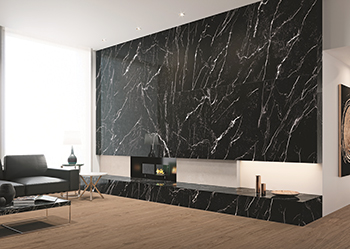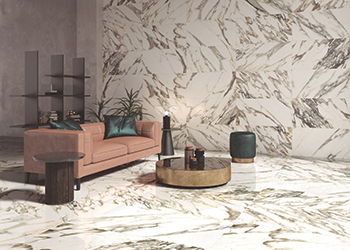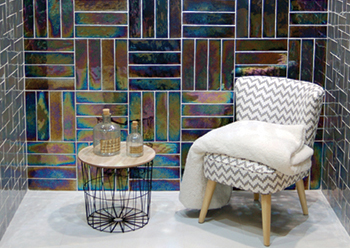 Coverlam’s Marquina series ... featuring large, weighty tiles in black marble.
Coverlam’s Marquina series ... featuring large, weighty tiles in black marble.
Dramatic interiors are in as minimalism is set to make way for this new language of luxury, according to Ascer, the Spanish Ceramic Tile Manufacturers’ Association.
Hugely influenced by the world of fashion, interiors in the coming year seek to recreate theatre sets, with light and shadows taking center stage. New weighty marbles and stones, luxurious metals, dark iridescence and the digital world provide the inspiration for interiors of the future, says a spokesman for Ascer.
“We have moved on now from the period when minimalism was the creed and elegance was always associated with neutral, subdued colours. In the current decorative trend, drama is king,” the spokesman remarks.
 |
|
Museum’s Macchia Vecchia Collection caters to the trend towards large-format slabs with deep veining. |
He says the old expression ‘less is a bore’, coined by American architect Robert Venturi back in the seventies and which launched the post-modern movement, is once again being quoted.
According to the ‘Observatory for Trends in Interiors’, the simplicity and minimalism that held sway in recent years have been discarded and new frontiers are being discovered in the more decorative styles.
One of these, dubbed ‘Dramatic Interior’, offers a fresh take on luxury with dramatic, almost magical touches and designs full of theatrics and drama. In terms of ceramic tiles, this translates into large-format slabs in dark colours with very distinct veining.
Natural stone and marble have become more sophisticated and are far from being just flat, neutral surfaces. There is a clear taste for materials that are strong on personality, with plenty of veins and diagonal lines, pronounced changes in colour and sandstone effects, the spokesman says.
The collections following this trend have moved away from the more classic styles and were modelled on semi-precious stones such as onyxes, delivering enhanced versions of them.
 |
|
Life Ceramica’s Dreams Series offers metallic finishes. |
“Dark colours are the most prominent, with a very strong presence of black and very dark blues. Metallics make an appearance but are more sophisticated, with metals that evoke a world of luxury, dark iridescences, materials of unknown provenance, veiled and blurred surfaces. It is hard to recognise clear references to nature in this trend, the preference being for a certain artificiality that adds drama to the space,” the spokesman points out.
Large, weighty tiles are a feature of this trend. There is a distinct neoclassical influence evident in the revival of decorative elements from the period, updated versions of which are being seen on surfaces. Organic elements and the patterns of marquetry and inlay that combine different coloured marbles are just two examples of the elements that have been revived.
Several members of Ascer have responded to these trends and currently offer a choice of collections that feature large-format slabs in dark colours with very distinct veining. Among them are Apavisa, Azteca, Coverlam, Ceracasa, Colorker, Life Cerámica and Museum.
Ascer was founded in 1977 when it replaced and increased the activities of the National Syndical Group of Tile Industries (ANSIA), which had been operating since 1959 and was officially recognised by the Group of Tile Manufacturers, an organisation that was set up in the 40s.
With approximately 135 members, Ascer includes and represents practically all of Spain’s ceramic tile manufacturers. Production and exports within the sector by non-member companies – mostly small business using traditional production methods – represent less than three per cent of the total.








.jpg)




.jpg)




























.jpg)
































